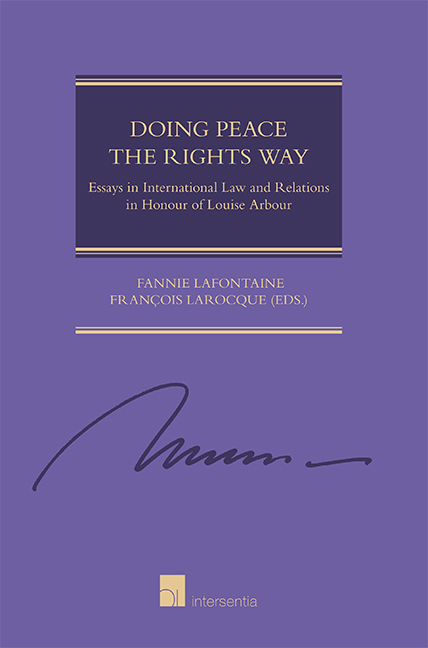Book contents
- Frontmatter
- Foreword
- Contents
- List of Contributors
- Introduction
- PART I OF FREEDOM AND EQUALITY
- Human Rights Obligations for Non-State Actors: Where Are We Now?
- The Right to Truth: When Does it Begin?
- Corruption, Inequality and Boko Haram in Nigeria
- Social and Economic Rights and the Legal Imagination
- Building a Culture of Inclusivity in a Diverse Society
- Made in Canada: A Failed War on Drugs
- Unaccompanied Children Out of Their Country of Origin: Trapped in the Administrative Net
- PART II OF PEACE AND JUSTICE
- PART III OF WOMEN AND LEADERSHIP
- An Interview with the Honourable Madam Justice Louise Arbour
Social and Economic Rights and the Legal Imagination
from PART I - OF FREEDOM AND EQUALITY
Published online by Cambridge University Press: 13 April 2019
- Frontmatter
- Foreword
- Contents
- List of Contributors
- Introduction
- PART I OF FREEDOM AND EQUALITY
- Human Rights Obligations for Non-State Actors: Where Are We Now?
- The Right to Truth: When Does it Begin?
- Corruption, Inequality and Boko Haram in Nigeria
- Social and Economic Rights and the Legal Imagination
- Building a Culture of Inclusivity in a Diverse Society
- Made in Canada: A Failed War on Drugs
- Unaccompanied Children Out of Their Country of Origin: Trapped in the Administrative Net
- PART II OF PEACE AND JUSTICE
- PART III OF WOMEN AND LEADERSHIP
- An Interview with the Honourable Madam Justice Louise Arbour
Summary
INTRODUCTION
The turn of the last millennium launched a period of renewed dynamism around social and economic rights (SERs) or human rights to food, housing, health care, education, and the like. Although these rights have formed part of the contemporary human rights canon, at least since the Universal Declaration of Human Rights, and are included in the majority of contemporary constitutions, there has been little dispute that SERs have been neglected relative to civil and political rights. The reasons are historical, methodological, and deeply political. By the year 2000, however, new constitutions were increasingly including such rights. Courts were beginning to develop ways to adjudicate them across the world, most famously in South Africa and India. Prominent US scholars observing these developments were reversing long-held positions and were now opining that such rights could indeed be enforceable in courts. International institutions and organizations were finally beginning to prioritize them.
Canada's judiciary was not immune from this millennial energy. In the fall of 2002, soon aft er I became a law clerk for Supreme Court of Canada Justice Louise Arbour, the Court handed down its decision in Gosselin v. Quebec, its first response to an explicit constitutional, social and economic rights-based social welfare claim. The province of Quebec had introduced a law decreasing social assistance payments to persons under 30 who, for any reason, failed to participate in a workfare program. Canada's Charter of Rights and Freedoms makes no specific mention of rights to welfare or to an adequate or minimum standard of living, and so Ms. Gosselin argued that the constitutional guarantees of life, liberty and security of the person in s. 7 of the Charter ought to be broadly interpreted so as to invalidate the law. The majority of the Court denied the claim on the basis that Ms. Gosselin had not demonstrated “actual hardship,” though it left open the possibility that positive SERs might be read into s. 7 in a future case. Justice Arbour, in a famous dissent, would have allowed the claim.
- Type
- Chapter
- Information
- Doing Peace the Rights WayEssays in International Law and Relations in Honour of Louise Arbour, pp. 65 - 84Publisher: IntersentiaPrint publication year: 2019



